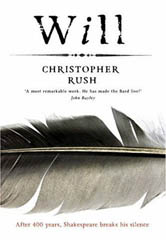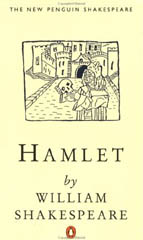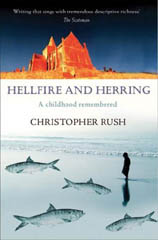Christopher Rush
Will
 To attempt a novel about the life of Shakespeare will be viewed by many as audacious, by some as an impertinence, and by others as a foolhardy undertaking that rightly derives the opprobrium bound to follow. Yet, Christopher Rush’s Will can only be described as a spectacular feat, a prodigious enterprise, and a most remarkable production.
To attempt a novel about the life of Shakespeare will be viewed by many as audacious, by some as an impertinence, and by others as a foolhardy undertaking that rightly derives the opprobrium bound to follow. Yet, Christopher Rush’s Will can only be described as a spectacular feat, a prodigious enterprise, and a most remarkable production.
The narration observes the classical unities of time, action and place, for which ironically Shakespeare himself had little regard, (‘whether Shakespeare knew the unities, and rejected them by design, or deviated from them by happy ignorance, it is, I think, impossible to decide, and useless to inquire’, wrote Dr Johnson). Rush’s story opens and closes in Stratford upon Avon, in Shakespeare’s bedchamber. It is 25th March in the year 1616, and Shakespeare is to be dead within a month. In this, Shakespeare’s last production, the dramatis personae are few: Shakespeare himself, and his lawyer Francis Collins. Anne Hathaway and a maid also figure, though as little more than walk-on parts. Wishing to put into order his affairs temporal and spiritual, Shakespeare has called in his friend and lawyer to draw up his final will. So begins his valediction to the world. Some of this is addressed directly to Collins; some of it delivered as interior monologue, some of it perhaps dreamt. The will writing itself is – or rather becomes – a straightforward enough matter, save for the device of interpolated questions from Collins to assist his – and our – understanding. For the greatest part, the narrative is a monologue, where Shakespeare summons up ‘remembrance of things past’. Just as in the plays, all life is represented in these memories, which Shakespeare delivers before us as versions of  ‘tragedy, comedy, history, pastoral, pastoral-comical, historical-pastoral, tragical-historical, tragical-comical-historical-pastoral.’ As an artistic unity, this final, or even first telling, constitutes a ‘scene individable’, perhaps even a ‘poem unlimited’.
‘tragedy, comedy, history, pastoral, pastoral-comical, historical-pastoral, tragical-historical, tragical-comical-historical-pastoral.’ As an artistic unity, this final, or even first telling, constitutes a ‘scene individable’, perhaps even a ‘poem unlimited’.
Though posterity has left us with the barest of biographical facts about Shakespeare, Rush, who was until retirement a schoolmaster, has his subject take us on a retrospect; from his entrance, through the ‘lost years’, to his exit from that stage on which he was a player. In so doing, he gives us his own ‘seven ages of man’. When Dr Johnson wrote about Pope’s Rape of the Lock, ‘in this work … are exhibited, in a very high degree, the two most engaging powers of an author: new things are made familiar, and familiar things are made new,’ he might well have been describing Rush’s Will. It brilliantly synthesises the novelistic and the dramatic.
Rush does, I think, no injury or disservice to Shakespeare. Early on in Rush’s novel, Shakespeare reveals his fear of sextons and his anxieties about his bones. By its close, the truth about his Catholicism and his bi-sexuality has been revealed. The identity of the ‘Dark Lady’ of the Sonnets is made known, (though for dramatic purposes Rush transforms her from a poet to a musician) and the speculation concerning Shakespeare’s second best bed is finally ended.
Ingenious and original, Will is diverting and amusing, poignant and moving. It is also instructive, but not in a schoolmasterly way.  Interestingly, Rush does nod across continents and space in the direction of Borges, who once wrote about Shakespeare: ‘no one has ever been so many men as this man who like the Egyptian Proteus could exhaust all the guises of reality. At times he would leave a confession hidden away in some corner of his work, certain that it would not be deciphered; Richard affirms that in his person he plays the part of many and Iago claims with curious words ‘I am not what I am’…History adds that before or after dying he found himself in the presence of God and told Him: I who have been so many men in vain want to be one and myself. The voice of the Lord answers from a whirlwind: Neither am I anyone; I have dreamt the world as you dreamt your work, my Shakespeare, and among the forms in my dream are you, who like myself are many and no one.’
Interestingly, Rush does nod across continents and space in the direction of Borges, who once wrote about Shakespeare: ‘no one has ever been so many men as this man who like the Egyptian Proteus could exhaust all the guises of reality. At times he would leave a confession hidden away in some corner of his work, certain that it would not be deciphered; Richard affirms that in his person he plays the part of many and Iago claims with curious words ‘I am not what I am’…History adds that before or after dying he found himself in the presence of God and told Him: I who have been so many men in vain want to be one and myself. The voice of the Lord answers from a whirlwind: Neither am I anyone; I have dreamt the world as you dreamt your work, my Shakespeare, and among the forms in my dream are you, who like myself are many and no one.’
Any perceived ‘defects’ or serious criticisms of Will are best left to sad purists and professional dullards, who will doubtless pounce up on them with relish. Though I half suspect that Rush, like Borges, has ‘hidden away in some corner of his work’ a thing or two for said purists and dullards to find, so demonstrating that they have entirely missed the point. Of particular delight to me is Chapter twenty-four, where young Will has seemingly strayed into a novel of the picaresque kind of a century and a half later. I rejoiced in the few Scotticisms that this book’s ‘onlie begetter’ gives us, and regret that I could not find a single use of ‘incarnadine’.
Dr Johnson said about meretricious work: ‘what is written without effort is in general read without pleasure.’ Though it might appear that Rush has created this work with apparent effortlessness, the opposite is true and naturally proves Johnson’s observation. This book cannot be read without huge pleasure and immense wonderment at Rush’s great achievement.
© Michael Lister
Will by Christopher Rush (Beautiful Books, 2007) ISBN 9781905636143. £14.99

Comments